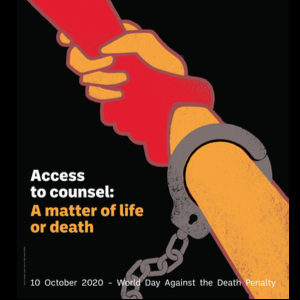
Access to justice in capital cases
- News
- 9 Oct 2020
Statement on 18th World Day Against the Death Penalty
Access to justice and minimum fair trial guarantees in capital cases are non-negotiable. Those facing the death penalty should be afforded special protection and all guarantees to ensure a fair trial without exception.
International law requires stringent adherence to principles of due process where the death penalty is involved. The United Nations Human Rights Committee has repeatedly emphasised that “in capital cases scrupulous respect of the guarantees of fair trial is particularly important”. This includes being tried before a ‘competent, independent and impartial tribunal’, with adequate time and facilities to prepare a defence. The Committee has stated that “in cases involving capital punishment, it is axiomatic that the accused must be effectively assisted by a lawyer at all stages of the proceedings”. Likewise, the African Commission on Human and People’s Rights has emphasised that “the interests of justice always require legal assistance for an accused in any capital case”.
The most basic of standards provided in all domestic constitutions and articulated in international treaties requires all persons to be equal before courts. However, this is not the case in practice. Discrimination is never more evident than when one looks at those who are on death row. Our work has consistently revealed that death row populations are disproportionately represented by the poor and economically disadvantaged, persons with psychosocial or intellectual disabilities, foreign nationals and other marginalised members of society. We know that access to justice for the majority is a myth rather than a reality; that poverty, illiteracy and language barriers often result in failure to respect the absolute right to effective legal representation. We work in some of the most fragile legal systems in the world where those facing a potential death sentence or execution have little or no access to a lawyer at all stages of the legal process.
It is impossible to discuss fairness and access to justice without addressing the issue of wrongful convictions. The overwhelming evidence suggests that even where procedural guarantees are improved, wrongful convictions and miscarriages of justice still occur. The risk that innocent people will be executed can never be eliminated because no perfect criminal justice system exists. Where there is inequality and discrimination, many more prisoners on death row will be convicted for crimes they did not commit and sentenced to death as they did not have a fair opportunity to prove their innocence.
Grossly underfunded criminal justice systems and ineffective legal assistance remain part of the death penalty problem. Once it is recognised that states cannot guarantee basic and minimum fair trial guarantees and access to justice for all, the question is not whether an individual deserves to be sentenced to death or executed, but whether the state maintains the right to deprive citizens of the most basic human right, namely the right to life.
World Day Against the Death Penalty
Held every year on 10 October, World Day Against the Death Penalty is organised by the World Coalition Against the Death Penalty, of which The Death Penalty Project is a steering committee member.
A specific theme is highlighted each year. The 18th World Day Against the Death Penalty is dedicated to the right to effective legal representation for individuals who may face a death sentence.




















